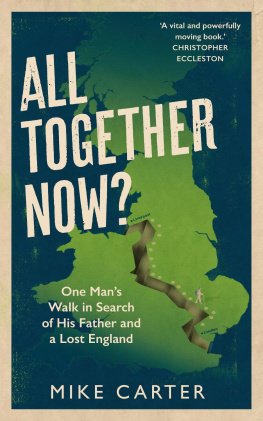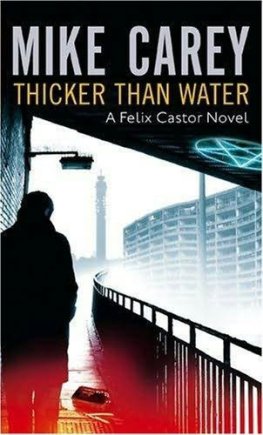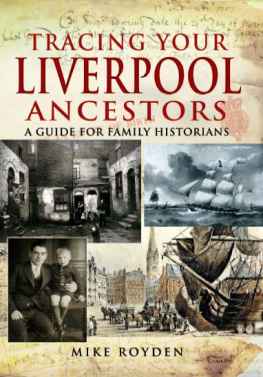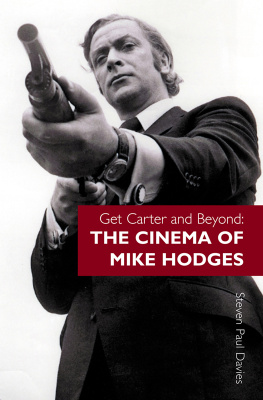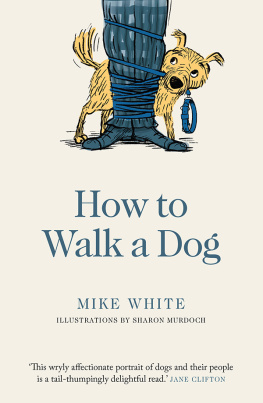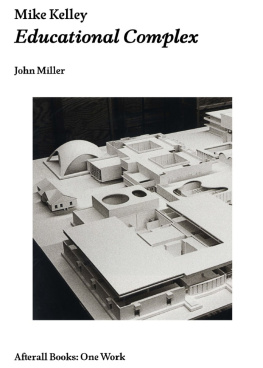(BIRMINGHAM)
It is a bitter winters morning in 2010. Two men, both in their early seventies, are on a bus, somewhere in Birmingham. The windows are steamed up. Outside it is still dark, a brilliant frost shimmering under the tungsten glow of the street lights. One of the men walks along the top deck, the other along the bottom, each handing out forms to the passengers along with little pens, like the ones you get in Argos. They are questionnaires from the bus-operating company, asking: Dear Customer, how many times a week do you travel?; at what time?; are you happy with the service?; what can we do to improve? At the bottom of the form there is a box marked other comments.
The two men often skim through the responses, though it isnt part of their remit to do so. Many of the customers seem happy with the bus service, but there are complaints about the prices. In the other comments section, some people write that bringing back conductors would make them feel safer, especially at night. These must be older people, the two men reckon, as there havent been conductors on Birminghams buses since the 1970s. On one form, somebody had scored through the word customer and written passenger, followed by three exclamation marks. Quite a few people write that theyd like to see the buses being run by the council again, that since deregulation in the mid-eighties, things had got steadily worse. There are always a few forms adorned with giant penises and hairy balls, or WBA rule, or Villa scum, depending on which route they were following. But they all get filed away in the bags that the two men carry.
At the terminus, the two old men alight and sit on a low wall, hunched up and freezing, waiting for the next bus. From a distance, the cold, pre-dawn air makes it look as if they are both chain-smoking, with huge plumes emitting from their mouths. One of the men does light a cigarette, his chest rasping and wheezing. Hes been a heavy smoker from the age of twelve and he will be dead from lung cancer within a year. But at that moment he has no idea of the cellular changes going on within his body. He is immortal.
This is the first time the two men have worked together. They havent even exchanged names. They start talking. The non-smoker speaks a little about his family, about his grandchildren. He had retired a decade ago, but he got bored at home, and his pension isnt enough to survive on, so he picks up shifts working on the buses, handing out forms.
The smoker says that he couldnt afford to retire either.
The non-smoker says the bus work is OK, but it is a bit, well, demeaning, compared with his old career.
What was that, asks the smoker.
Copper, the non-smoker says. Spent all of his life in the force. Worked his way up to be an undercover officer. That was exciting work. Dangerous too.
The smoker asks a lot of questions, offers not too much information about himself. The ex-copper is happy to talk endlessly: he cant believe his luck, that this stranger seems to find his life so interesting and important, as if he were a famous actor or politician. He hasnt felt this way in years.
Emboldened, the ex-copper starts telling a story about a surveillance job hed been on in the early 1970s. He had been assigned to a team watching a notorious communist troublemaker, a nasty piece of work. They had taken over a room on the first floor of a pub in Aston, from where they filmed and recorded the comings and goings at the troublemakers house opposite, twenty-four hours a day. The man in question had led the building workers strike in Birmingham in 1972, stirring up trouble. The strikers said that they were fighting against the building firms introduction of casualised labour, or the lump, as it was called, and wanted to protect the terms and conditions of building workers. But, the ex-copper said, anybody could see that it was just the work of communist agitators, trying to bring down the state.
Does he remember the name of the pub, the smoker asks.
The Guild Arms on the Witton Road, the ex-copper replies. The bloke had two young kids; all sorts of people would come and go at all hours. God knows what was going on in that house. But the biggest thing, he said, was that his wife was stunning and yet he was a right ugly bugger. That had annoyed the lads.
Can you remember his name, the smoker asks.
Ill never forget it, the ex-copper says. His name was Pete Carter.
The smoker throws his butt onto the floor, crushes it under his foot, and turns to the other man, holding out his hand.
Pete Carter, he says. Nice to meet you.
(WEST MIDLANDS TO LONDON)
Pete Carter was my father. I was one of his two kids. He died on 11 October 2011, aged seventy-three. Pete had left school in West Bromwich aged fifteen in 1953, illiterate, one of six children of alcoholic parents. He trained as a bricklayer and had been politically radicalised on the building sites in the late fifties. He joined the Young Communist League and his political career flourished: in the early seventies, hed led the Birmingham building workers in their successful strike action against the use of casual labour; he played his part in the miners strike of 198485, and went on to become the industrial organiser of the Communist Party of Great Britain.
Pete was not an important man, like the usual subjects of national newspaper obituaries. He was neither a general nor a bishop. Yet hed had enough old friends at the Guardian to agitate for a proper send-off in print. Pete, his friends had argued, was one of the last of a breed of self-educated, working-class, chest-thumping orators; part of a generation whod fought for the huge changes in social mobility that peaked in the UK in the mid-1970s. Men and women like Pete had campaigned for the Sex Discrimination Act and the decriminalisation of homosexuality. They had fought against US nuclear bombs being sited in the UK, and were in the vanguard of the nascent green movement. Pete was an engaged citizen, belonging to a generation of working-class people who felt that their moment had come and that it would last forever.
In 1981, Pete had been asked by the TUC to be one of the three main organisers of the Peoples March for Jobs. Organising it was to be his greatest achievement. With shades of the 1936 Jarrow Crusade, the Peoples March for Jobs saw around three hundred unemployed men and women walk from Liverpool to London in protest against Margaret Thatchers Conservative government. Elected in May 1979, Thatcher introduced monetarist policies that had, within two years, ripped the heart out of Britains traditional manufacturing base and sent unemployment rocketing towards three million.
I was born in 1964, so was only fifteen when Thatcher came to power, not yet old enough to vote. I was seventeen in 1981 when those marchers set off from Liverpool. Although I had been unemployed myself, and although Pete had asked me to march, I had not been among them. For Pete was effectively dead to me at that time.
Accompanying that Guardian obituary was a photograph of my father in a donkey jacket, addressing a group of building workers, their feather haircuts making the photo look like a still from Top of the Pops circa 1972. In their hands were placards shouting: We will fight to kill the lump. In the text, Pete was described as an idealist, with a turbulent love life.
That turbulence had ended Petes marriage to my mum, Norma, four years before the Peoples March. I stayed with her, and went off the rails. Mum had got cancer not long after Pete left, and by 1987 she was dead. Somewhere along the line, my elder sister, Sue, and I told ourselves a story that Pete had killed our mum.

